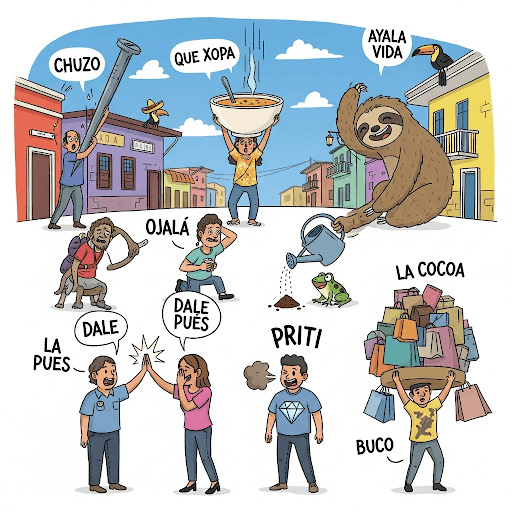Must-Know Panamanian Slang
These are the most popular and widely-used slang terms across Panama. Master these and you'll fit right in!
¡Qué chevere!
How cool! / Awesome!
Used to express excitement or approval
¡Qué chevere que vengas a Panamá! (How cool that you're coming to Panama!)
Bacano
Cool / Great / Awesome
Similar to 'chevere' but more casual
Ese lugar está bacano (That place is really cool)
Jupa
Head / Brain (also used for smart person)
Can mean head literally or calling someone smart
Usa la jupa (Use your head) or ¡Eres una jupa! (You're so smart!)
Fren
Dude / Bro / Friend
Casual way to address friends
¿Qué tal, fren? (What's up, dude?)
Voltear
To hang out / Chill
Spending time casually with friends
Vamos a voltear en el parque (Let's hang out in the park)
Chercha
Party / Fun time
Any kind of celebration or good time
Vamos a hacer chercha esta noche (Let's party tonight)
Regional Expressions
Panama City
Está en la lucha
Struggling financially / Working hard to get by
Everyone's grinding to make ends meet
Ponerse mosca
To get suspicious / Be alert
When something seems fishy
Estar arrecho
To be angry / upset
Don't confuse with other countries - means angry in Panama
Tigre
Money / Cash
¿Tienes tigre? (Do you have money?)
Jodón
Someone who likes to joke around / Troublemaker
That person who's always messing around
Interior / Provinces
Concho
Shared taxi / Public transport
In rural areas, informal transportation
Jajear
To work hard / Hustle
Common in farming communities
Ñame
Food / Meal
¿Ya comiste ñame? (Did you eat already?)
Estar empepado
To be drunk
Rural slang for being intoxicated
Manganzón
Lazy person
Someone who doesn't like to work
Caribbean Coast
Relajao
Relaxed / Chill person
Someone with a laid-back Caribbean attitude
Bochinche
Gossip / Drama
All the latest news and rumors
Jangueo
Hanging out / Partying
Caribbean coast party scene
Cuero
Attractive woman
Be careful - can be offensive depending on context
Estar en nota
To be in the mood / Feeling good
When you're feeling the Caribbean vibe
Bocas del Toro
Irie
Everything's good / All right
Jamaican influence - positive vibes
Pana
Friend / Buddy
Close friend, like 'bro'
Vacilón
Fun / Good time
Having a blast at the beach
Estar en ambiente
To be in the party mood
When the island vibes hit just right
Jalao
Crazy / Wild
Someone who's a bit wild or eccentric
Slang by Category
Positive Reactions
¡Brutal!
Amazing!
When something is really impressive
¡Que nota!
How cool!
Expressing excitement
¡Jevi!
Cool!
Quick approval
¡Tuanis!
Awesome!
Everything's great
Money & Work
Tigre
Money
¿Tienes tigre? (Got money?)
Jajear
To work hard
Tengo que jajear (I need to work)
Bregar
To hustle/struggle
Bregando en la vida (hustling in life)
Lucha
The struggle
Estoy en la lucha (I'm struggling)
People & Relationships
Fren
Friend/Dude
Casual address for friends
Pana
Close friend
Like 'bro' or 'buddy'
Jupa
Smart person
¡Eres una jupa! (You're smart!)
Relajao
Chill person
Someone laid-back
Activities & Fun
Chercha
Party
¡Vamos a la chercha!
Voltear
Hang out
Let's chill together
Jangueo
Partying
Going out scene
Vacilón
Good time
Having fun
Avoid These Common Mistakes
False Friends with Other Countries
- Don't say '¡Órale!' (Mexican) - use '¡Qué chevere!' instead
- 'Arrecho' means angry in Panama, not horny like other countries
- 'Coger' is safe to use in Panama (to take/grab) unlike Argentina
- Don't use 'Güey' (Mexican) - say 'Fren' or 'Pana' instead
- 'Chévere' is more common than 'Genial' for expressing approval
Context is Everything
- 'Jupa' can mean head or smart person - context matters
- 'Cuero' can be offensive - be careful with usage
- Age matters: older people might not understand newer slang
- 'Tigre' for money is very informal - don't use in business
- Some slang is regional - what works in Panama City might not in Azuero
Pronunciation Tips
- CHER-cha not SHER-cha (party)
- BA-ca-no with stress on first syllable (cool)
- CHE-ve-re with three clear syllables
- JU-pa short and sharp (head/smart)
- Don't roll R's too hard - Panamanian Spanish is softer
When NOT to Use Slang
- Job interviews - stick to formal Spanish
- Government offices - use 'usted' and formal language
- Talking to elderly people - show respect with formal Spanish
- Business meetings - professional language only
- First meetings - wait to see if others use slang first
Cultural Context
Using Slang Appropriately in Panama
When to Use Slang
- With friends: Perfect for casual conversations
- At parties: Shows you understand the culture
- In markets: Vendors appreciate local knowledge
- With younger people: They love when foreigners use slang correctly
Formality Rules
- Always use 'usted': Panama is very formal even with slang
- Mix appropriately: Slang + formal pronouns works well
- Read the room: Some situations call for zero slang
- Age awareness: Older generations prefer formal Spanish
Pro Tip
Start with safer slang like "chevere" and "bacano" before moving to regional expressions. Listen to how locals use slang in different situations and mirror their energy level.
